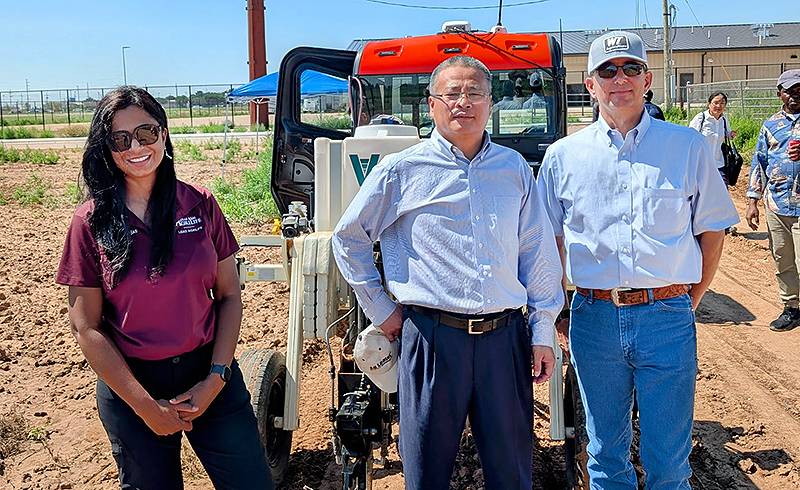
As climate change, labor shortages, and resource constraints reshape American agriculture, researchers are turning to drones, real-time data, and machine learning to boost yields and sustainability. That transformation was on full display Thursday, July 10, at Texas Tech’s Precision Agriculture Workshop, where experts demonstrated the power of AI-driven tools to solve modern farming challenges.

Highlights included unmanned aerial vehicle (UAV) remote sensing, soil electrical conductivity (EC) mapping, real-time kinematic (RTK) automatic guidance and robotics, along with hands-on image analysis and data processing. During the day-long meeting, presentations and technology demonstrations moved between Texas Tech’s Quaker Research Farm and the National Ranching Heritage Center in Lubbock.
The technology demonstrations and workshop are related to the education and training component of a USDA-funded grant, called Capacity Building for AI-driven Research & Education on UAS Applications in Precision Agriculture. Institutions participating in the event included Texas Tech, Texas A&M University, West Texas A&M University, Texas A&M AgriLife Research and Extension, and the USDA’s Agricultural Research Service.
Presentations included a program overview by Wenxuan Guo, an Associate Professor of Crop Ecophysiology & Precision Agriculture at Texas Tech and Texas A&M AgriLife Research. That portion of the program was followed by presentations on the application of UAV images in cotton cultivar selection, guidance system and EC mapping, UAV image acquisition, three-dimensional (3D) robot phenotyping system, UAV image stitching; UAV image analyses; spatial data integration, and AI and satellite imagery in cotton yield prediction.
In addition to Guo and his research team, other key principle investigators were Nithya Rajan, a professor of crop physiology & agroecology at Texas A&M; Craig Bednarz, an associate professor and Director of the Semi-Arid Agricultural Systems Institute at West Texas A&M University; Victor Sheng, an associate professor in Texas Tech’s Department of Computer Science; Chenggang Wang, an associate professor in Texas Tech’s Department of Agricultural & Applied Economics; and Susan O’Shaughnessy, a research agricultural engineer with the USDA Agricultural Research Services.
At the heart of Thursday’s workshop was a shared goal: promoting precision ag programs to address crucial agricultural production challenges and support technology training that benefits researchers, students and farming communities.
Guo, who joined Texas Tech’s Davis College of Agricultural Sciences & Natural Resources in 2016 after working as a global environmental modeling scientist for Monsanto, has long been an advocate for real-world agricultural innovation. His research — a blend of environmental modeling, remote sensing and agronomy — is helping lay the groundwork for data-driven decision-making in the field.
CONTACT: Wenxuan Guo, Associate Professor of Crop Ecophysiology & Precision Agriculture | Joint appointment - Texas AgriLife Research, Department of Plant & Soil Science, Texas Tech University at (806) 834-2266 or wenxuan.guo@ttu.edu
0714NM25
